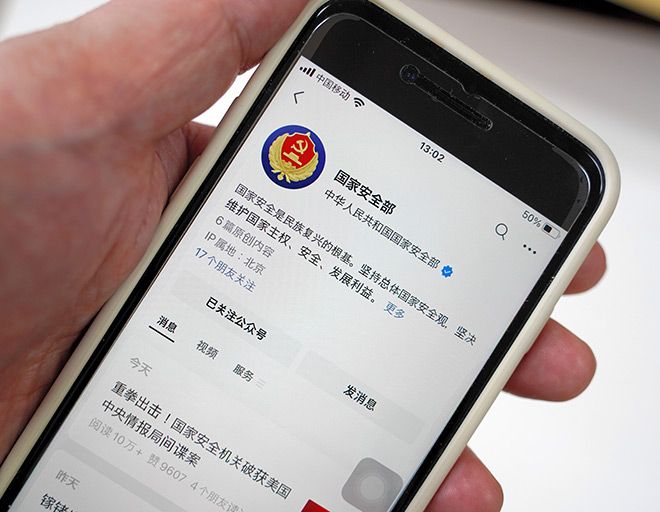October 23, 2023 at 13:01 JST
 A post on the official website of China’s Ministry of State Security is about the “detection of a U.S. CIA espionage case.” (Photo by Tokuhiko Saito)
A post on the official website of China’s Ministry of State Security is about the “detection of a U.S. CIA espionage case.” (Photo by Tokuhiko Saito)
Many executives and employees of Japanese companies doing business in China now face a nagging question: Is it safe to travel there?
Japanese business people cannot help feeling unsafe when they visit the neighboring nation with close economic ties with Japan. The situation is nothing short of extraordinary.
This undercurrent of anxiety among Japanese has been fueled by China’s detainment in March of a Japanese employee of Astellas Pharma Inc.’s Chinese unit on suspicion of violating the nation’s anti-espionage law.
The male employee of the Japanese pharmaceutical company has been interrogated for over six months under criminal detention. He was recently formally arrested. With legal procedures to determine an indictment still pending, there is little hope for his early release.
What exactly did he do that was construed as espionage? The specifics of the allegations remain undisclosed.
While complete transparency might be too much to ask for given the situation, China’s high-handed approach to clamping down on alleged spying is riddled with problems.
Foreign businesses operating in China have long complained about the vague definition of espionage under the law.
A legal revision enacted in July expanded the scope of information covered by the law to include not just “state secrets” but also “documents and data relevant to national safety and interests.” Yet, the law does not clearly explain what constitutes “national safety and interests.”
In recent months, China has stopped releasing various key economic statistics, such as age-specific unemployment rates and data related to consumer spending and investment.
These actions seem to signal Chinese policymakers’ nervousness about the weakening of China’s once red-hot economy. A person researching the real health of the Chinese economy is now more likely to be labeled a spy.
There have been cases where employees of U.S. credit research and consulting firms became targets of espionage investigations in China.
Since 2015, 17 Japanese citizens have been detained in China on suspicion of espionage.
Some observers have noted that the Chinese government views Japan’s Public Security Intelligence Agency as a spy organization and keeps a close watch on any individual associated with the agency.
Hideji Suzuki, former president of the Japan-China Youth Exchange Association, returned to Japan in 2022 after spending six years in a Beijing prison for what he said were false spying charges.
Suzuki wrote in his book that his only link with the agency was exchanging views about the Chinese situation with an acquaintance at the organization. Beijing apparently took excessive action against him.
Some within the Chinese government seem concerned that this aggressive stance on espionage could damage the bilateral economic relationship.
Chinese Commerce Minister Wang Wentao said Beijing is aware that “Japanese companies are feeling a tremendous amount of anxiety” over the matter. He organized a meeting to explain China’s anti-espionage policy for foreign businesses.
However, this concern is apparently not shared by the Ministry of State Security, which is responsible for exposing and arresting spies. The ministry has even encouraged Chinese citizens to report suspected spying, which inevitably serves as a strong disincentive for interactions between Chinese and foreigners.
Tokyo’s only option in this situation is to lobby the top echelons of President Xi Jinping’s administration to adopt a more reasonable approach.
We urge the Japanese government to swiftly arrange meetings with top Chinese officials and strongly urge them to make serious efforts to tackle this problem.
--The Asahi Shimbun, Oct. 22




















A peek through the music industry’s curtain at the producers who harnessed social media to help their idols go global.
A series based on diplomatic documents declassified by Japan’s Foreign Ministry
Here is a collection of first-hand accounts by “hibakusha” atomic bomb survivors.
Cooking experts, chefs and others involved in the field of food introduce their special recipes intertwined with their paths in life.
A series about Japanese-Americans and their memories of World War II